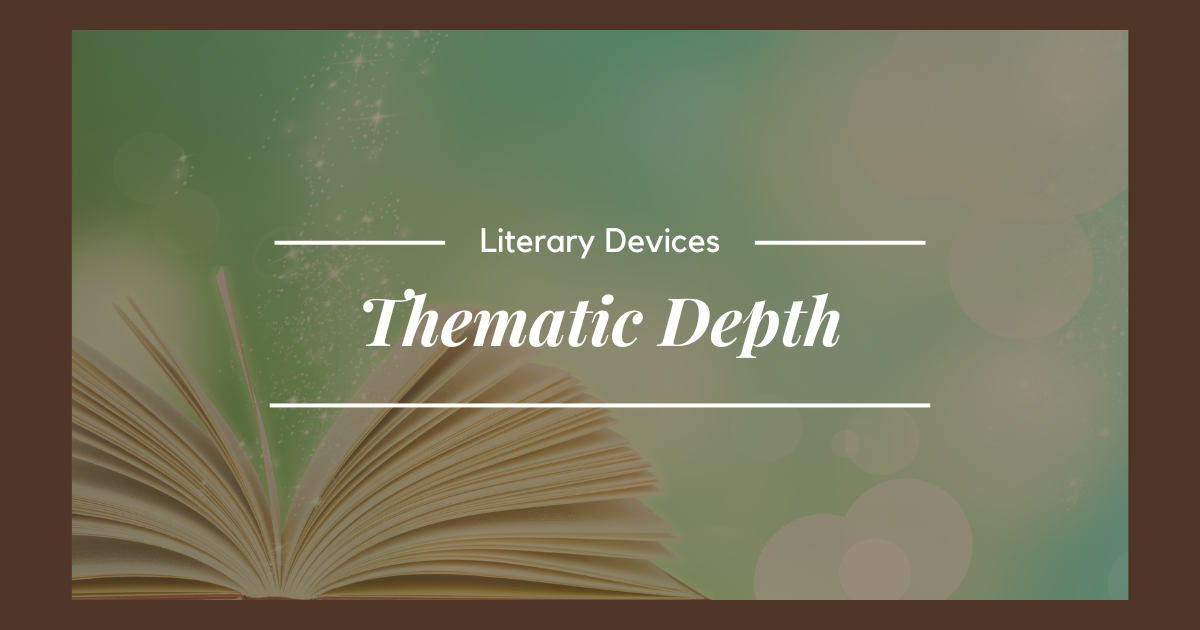Sometimes when reviewing a book, I struggle to put my finger on what made that particularly story so good. Why, when everything was said and done, it felt as though the story was more than the sum of its parts.
Then I landed on the answer: it’s thematically rich.
But what does this really mean, and how do we spot it in the wild? And how do we know when stories are lacking in this department?
Thematically rich stories engage readers on a deeper level.
Essentially, themes are the fundamental ideas or concepts that a story explores. So at its core, thematically rich storytelling involves the deliberate weaving of underlying messages and motifs throughout the narrative. They can range from broad, universal themes like love, power, and identity to more specific ones like the impact of technology on society or the complexities of familial relationships.
A thematically rich novel does not just tell a story; it provides a lens through which readers can examine the real world.
How can we identify it?
- Complex Characters: Rich themes often emerge through well-developed characters who grapple with internal and external conflicts. Their struggles, growth, and interactions reveal deeper insights about the themes. I have another blog specifically on the value of character stakes in storytelling.
- Symbolism and Motifs: Symbols and recurring motifs reinforce the themes in a subtle way. They’re often objects or settings that hold deeper meaning beyond their literal sense.
- Multi-layered Plot: A story with multiple layers and subplots can explore themes from various angles, providing a more comprehensive examination of the main themes.
- Emotional Resonance: A story that evokes strong emotions can make its themes more impactful. When readers feel connected to the characters and their journeys, the thematic messages resonate more profoundly.
- Side note: In my opinion, this point is especially important. The idea of “thematically rich storytelling” can come across as snobby or pretentious at a surface level, and I feel the knee-jerk reaction for many readers would be: “But I just want to have fun.” Yes, me too! A story can be fun and engaging and still make you come away with a deep sense of appreciation. I think The Hunger Games is a great example.
- Ambiguity and Complexity: Thematically rich stories often avoid simple answers or moral absolutes and leave room for gray area. This reflects the multifaceted nature of real-life issues and encourages deeper contemplation.
Alright, how can we spot thematically poor storytelling?
- Preachiness: When a novel becomes overly didactic, the themes can feel forced and superficial. Readers might feel lectured rather than invited to ponder and reflect. I have another blog on how moralistic literature often has the opposite of the desired effect.
- Cliché and Predictability: Themes should offer fresh perspectives or delve into nuances that challenge the reader’s thinking, not fall into predictable patterns that feel uninspired at best, and downright boring at worst.
- Lack of Integration: If themes are not seamlessly woven into the narrative, they can seem tacked on as an afterthought, or even irrelevant. Themes should naturally arise from the characters, plot, and setting, creating a cohesive whole.
- One-dimensional Characters: Flat, one-dimensional characters can weaken thematic exploration. Rich themes often require complex characters whose experiences and transformations illuminate deeper truths. It’s hard to do that when the character feels like a puppet or a Mary Sue.
- Surface-level Exploration: Addressing themes only superficially without delving into their complexities can leave readers unsatisfied. Rich thematic storytelling requires depth and a willingness to explore uncomfortable or challenging aspects, too.
This is what I’m looking for most of the time.
Oftentimes when a story isn’t keeping me interested, it’s usually because of a lack of thematically rich storytelling. I’m waiting for something more, something real or relatable or interesting, and it’s not delivering.
Don’t get me wrong. Every now and then I need a fun read that demands nothing of my brain power and delivers all vibes, no thoughts – but most of the time I’m looking for strong character stakes and rich themes. I don’t want to just to-and-fro with the character as they do plot things, I want to feel something real even amidst the deepest fantasy.
It’s also possible for a book to be such a try-hard in this area that it forgets to be fun – *ahem* The Secret History. I mean, who said that?
I would love to have you around! Subscribe below.
Check out some of my other recent blogs:







